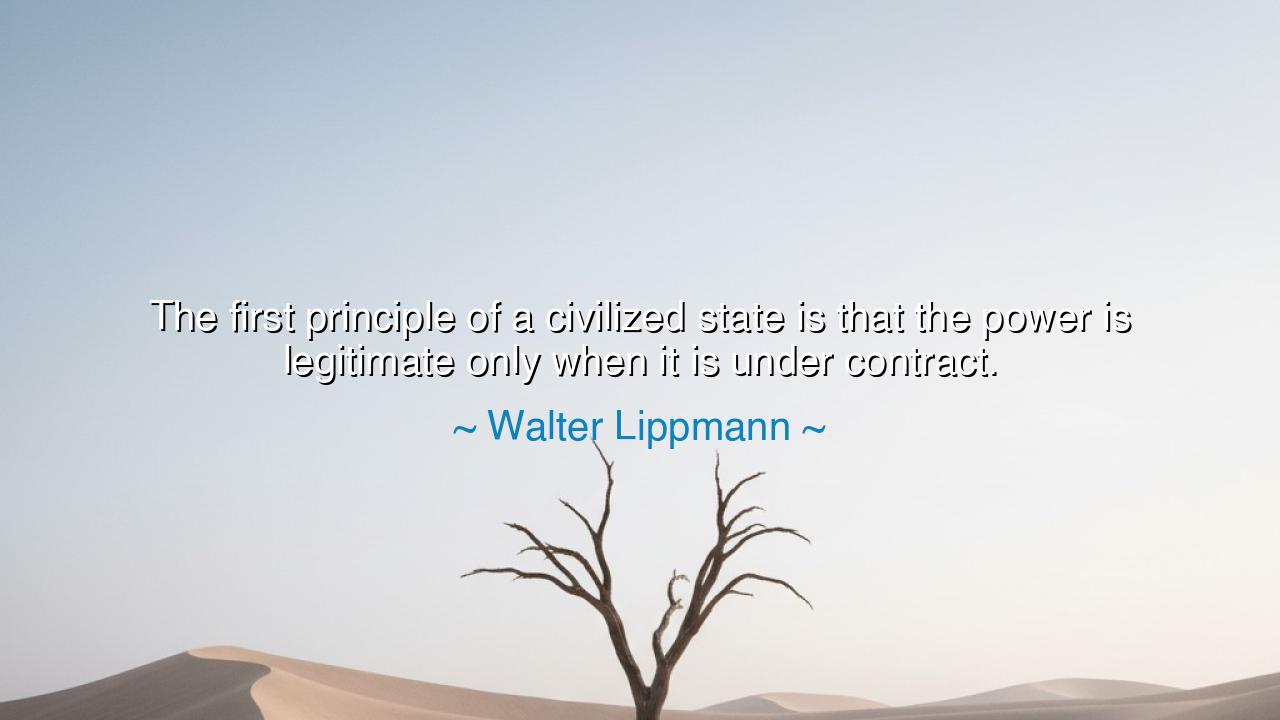
The first principle of a civilized state is that the power is
The first principle of a civilized state is that the power is legitimate only when it is under contract.






In this profound reflection, Walter Lippmann speaks to the very foundation of a civilized state. He declares that power is legitimate only when it is under contract, meaning that authority must not arise from mere force or the will of the few, but from a mutual agreement between rulers and the ruled. This is the essence of a social contract — the invisible bond that transforms raw power into rightful governance. Without such a contract, power is tyranny, and the state ceases to be a guardian of its people, becoming instead their oppressor.
The first principle Lippmann describes is rooted in the philosophy of thinkers like John Locke and Jean-Jacques Rousseau, who argued that governments are created by the consent of the governed. In this vision, citizens surrender certain freedoms to a collective authority, but only in exchange for protection, justice, and the preservation of their rights. If rulers break this sacred trust, the contract is void, and the people have not only the right but the duty to resist. Thus, legitimacy is not inherited, seized, or divine; it is earned through accountability and service to the common good.
History offers countless examples of this truth. The Magna Carta of 1215 was one of the earliest written contracts limiting the power of a king. Faced with rebellion, King John of England agreed to respect certain rights of his nobles, planting the seeds for constitutional governance. Centuries later, the American Revolution was born from the same principle: when the British crown violated its unwritten contract with the colonies through taxation without representation, the people rose up and declared their independence. These moments reveal how deeply the idea of contractual power is woven into the story of human freedom.
Lippmann’s warning also speaks to the dangers of forgetting this principle. When governments grow distant from their people, relying on coercion rather than consent, they drift toward chaos and collapse. The fall of the Roman Republic offers a grim lesson: as leaders like Julius Caesar concentrated unchecked power, the republic’s fragile balance shattered, giving way to dictatorship and the eventual ruin of Roman liberty. Without the restraint of contract, even the mightiest state crumbles under the weight of its own hubris.
Thus, Lippmann’s words are both a guiding light and a stern admonition. A civilized state is not measured by wealth, armies, or monuments, but by the trust between its people and its leaders. Power that flows from consent is like a river that nourishes the land; power seized by force is like a flood that destroys everything in its path. For future generations, this teaching stands as a timeless truth: to preserve freedom, we must ensure that every act of governance springs from the sacred covenant of the social contract, where rulers serve, and the people’s voice is sovereign.






BYNguyen Ngoc Bao Yen
The concept of power being legitimate only when under contract brings up ethical concerns about the role of government. Is it fair to say that the legitimacy of power is entirely dependent on public agreement? How does this principle hold up when we consider the complexities of government structures and the different interests of diverse groups within a state? I’d be curious to explore how this would apply to authoritarian regimes.
MQHoang Minh Quang
Walter Lippmann's quote about legitimate power being under contract makes me think about the balance between authority and individual freedoms. Can power truly be legitimate if it's not actively agreed upon by the people? Could this idea apply to current global situations where governments are often challenged for not reflecting the will of their citizens? How do we address this imbalance of power in practice?
Hhaonguyen
Lippmann’s statement about power and legitimacy touches on a key issue in political theory: the relationship between the governed and the government. How do we determine whether the contract between the state and its citizens is being upheld? Is the social contract a one-way street, or should citizens be allowed to revoke their consent when they feel their interests aren’t being represented adequately?
ATLe Van Anh Tai
The idea that power is only legitimate when it's under contract feels like a strong argument for participatory democracy. Does it mean that citizens should have more direct influence on political decisions beyond just electing representatives? I wonder how this principle applies in countries where citizens often feel powerless or disconnected from the political process. Would this shift change the nature of governance itself?
TYTran Yen
Walter Lippmann's quote about the legitimacy of power being under contract raises an interesting question about the role of consent in governance. How do we determine what constitutes a 'contract' in modern societies? Is it enough for citizens to vote in elections, or do they need to be more actively engaged in the decisions that shape their lives? This quote challenges the traditional idea of authority.